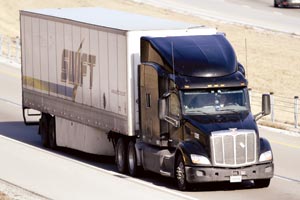Freight Markets Slow Down as 3Q Closes, Fleets Say

Freight markets languished as the third quarter came to a close last week, multiple sources said, while two large truckload carriers lowered their earnings outlooks.
Swift Transportation Co. and Universal Truckload Services Inc. said their earnings would fall about 30% short of average estimates compiled by Bloomberg News and would trail year-ago results for the same quarter as well.
“Universal’s financial performance reflects continuing soft demand for truckload transportation services from customers in the steel, energy and selected industrial sectors,” a Sept. 29 company statement said. Higher logistics costs and lower intermodal rates hurt the company that ranks No. 27 on Transport Topics Top 100 list of the largest for-hire carriers in the United States and Canada.
Universal gauged third-quarter earnings between 27 cents and 31 cents per share, compared with the average estimate of 43 cents and year-earlier profits of 44 cents.
Per-share earnings on average for the 12 largest carriers are expected to rise just 3% over 2014, despite fuel prices at six-year lows. In the second quarter, those carriers’ average year-over-year increase was 23%.
Swift outlined multiple reasons for earnings of 30 cents to 33 cents. Prior to its Sept. 25 announcement, Swift was expected to earn 43 cents per share. Third-quarter costs included 9 cents a share for injury and lawsuit expense.
Swift, No. 6 on the for-hire TT100, also said costs of 5 cents to 6 cents resulted from new truck delivery delays, which will be recorded in the third and-or fourth quarters.
The company also warned its fourth-quarter earnings would suffer because of business losses.
“Although we are not satisfied with these developments, we are encouraged by many of the underlying trends we are experiencing,” President Richard Stocking said.
He cited lower turnover, technology that’s improving safety and opportunities to further improve equipment utilization. Full-year earnings of as much as $1.52 per share will top 2014, the Phoenix-based company noted.
Robert W. Baird analyst Benjamin Hartford said about 75% of Swift’s shortfall appeared to be related to the company’s own issues, with the rest tied to “softer truckload trends.”
From the broker perspective, Ben Cubitt, a top official at Transplace, said “freight is really pretty flat right now. In some places, it’s up a little and some are down a little bit.”
He said capacity has “loosened” throughout the dry van, refrigerated and flatbed sectors.
“For the first time in a long time, we are having carriers calling and asking, ‘Do you have freight?’” said Cubitt, who is senior vice president of engineering. “That’s very unusual for this time of year.”
Cubitt said Transplace overall continues to seek more committed capacity over the long term to ensure the company can move freight when markets tighten again.
He also said there still is demand in some sectors to switch freight from the highway to truck-rail.
American Trucking Associations’ tonnage report also illustrated slowing growth, rising 2.1% from August of last year — less than the average 3.4% in the first seven months.
Analysts’ reports pinpointed reasons for market weakness.
“During the past four or five weeks, freight has weakened a notch after being fairly consistent all year,” said Thom Albrecht, a BB&T Capital Markets analyst.
Refrigerated markets have been particularly weak, he said, citing a bird flu epidemic.
“2015’s ‘peak’ season remains muted in September, and spot freight conditions remain soft,” said Hartford, the Robert W. Baird analyst.
“Spot truckload demand remains soft, with brokers noting capacity available in major markets [West Coast, Midwest],” he added.
Executives at Old Dominion Freight Line told analysts the economy feels weak. The No. 11 carrier on the for-hire TT100, which has the lowest operating ratio among publicly traded less-than-truckload carriers, is expected to raise earnings 13%.
The rest of the LTL operators also are expected to improve results. In the logistics sector, four of six companies should raise profits, analysts believe. Higher earnings also are forecast for No. 1 UPS Inc.

